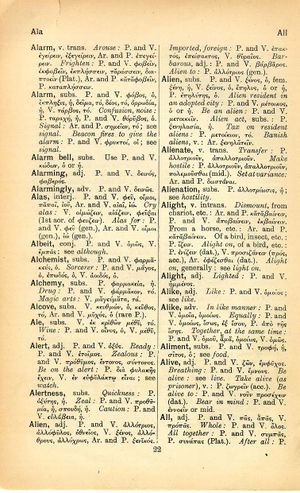all
English > Greek (Woodhouse)
adj.
P. and V. πᾶς, ἅπας, V. πρόπας.
Whole: P. and V. ὅλος.
All together: P. and V. σύμπας, P. συνάπας (Plat.).
After all: P. and V. ἄρα, V. ἆρα.
All but: P. and V. ὅσον οὔπω, P. ὅσον οὐ.
Nearly: Ar. and P. ὀλίγου.
They are all but here: P. ὅσον οὔπω πάρεισι (Thuc.)
They took one ship, crew and all: P. μίαν (ναῦν) αὐτοῖς ἀνδράσιν εἷλον (Thuc. 2, 90).
The black abyss of Tartarus hides old Cronos, allies add all: V. Ταρτάρου μελαμβαθής κευθμὼν καλύπτει τον παλαιγενῆ Κρόνον, αὐτοῖσι συμμάχοισι (Aesch., P.V. 219, cf. Eur., Cycl. 705).
At all events: P. and V. γε (enclitic), γοῦν.
One's all: P. τὰ ὅλα.
At all, in any way: P. and V. πως (enclitic), Ar. and P. πη (enclitic).
Not at all: P. and V. ἀρχὴν οὐ, P. οὐχ ὅλως, Ar. and P. οὐ τὸ παράπαν, V. οὐ τὸ πᾶν.
By no means: P. and V. οὐδαμῶς, μηδαμῶς, P. οὐδʼ ὁπωστιοῦν.
All the more: P. and V. τοσῷδε μᾶλλον, τοσούτῳ μᾶλλον.
All the less: P. and V. τοσῷδε ἧσσον.
On all grounds: P. and V. πανταχῆ.
Run on all fours: V. τρέχειν χερσίν (Aesch., Eum. 37).
It is all over with: see over.
All in all: see everything.
It is all one: see one.

